Where would we be without freedom of speech?
The freedom to express an opinion, no matter what it may be, is integral to the lives of people. More importantly, freedom of speech is fundamental to the existence of democracy where, without it, any system would inevitably crumble and fall to pieces. It is this human right which helps us to succeed as people, hold onto our identity and nurture our true selves – and it is this right which allows us to exercise and retain our free will. Whether it be in the form of an Islamic marriage where both parties to a Nikah say “qubul”, or to press freedom, where journalists (and even the likes of Katie Hopkins) have both the opportunity and platform to have their views heard, the existence of freedom of speech has been meticulously woven into the very fabric of our society where all individuals are encouraged to speak their truth without fear of any life-threatening backlash. But sadly, this is sometimes not the case – especially in other parts of the world. Which is what brings me to the situation in my country-of-birth, Bangladesh, where speaking your truth could indeed bring about the very real commination of life-threatening backlash…
Freedom of speech and the limitations on it have always been a topic of great discussion in Bangladesh – quite surprisingly so, as the country proudly presents herself as being a secular and democratic nation, whereby Article 39 of the Constitution of Bangladesh holds that every citizen’s freedom of thought, conscience, speech and expression is guaranteed. From bloggers in the past being butchered by fundamentalist groups for questioning the validity of religion, to students and activists being harassed and beaten by police-hired goons (or the police themselves) if found to have made any open criticism against the State, there has been an ongoing struggle in Bangladesh, where the elite and ruling-class have always held the reins of power, as opposed to the people. Growing up, my experience was (and still is) in stark contrast to that suffered by many people in Bangladesh.
I had it pretty easy compared to most South-Asian kids – in fact, I had it pretty easy compared to any kid, irrespective of age or background. When it came to having my voice heard, I could always count on my parents to give me the freedom to question anything that didn’t quite align with my sensibilities. Whether it be the patriarchy, politics, religion, race or (even) sex, no subject was ever too hush-hush or taboo. The cards were always laid out on the table, and I had my pick of sensitive topics which I could tear apart and challenge repeatedly. 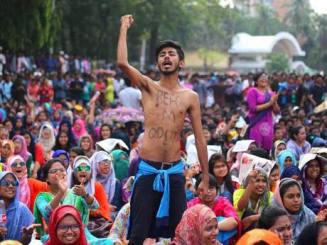
You could say that at home, my freedom of speech was always ensured. My inquisitive nature, paired with my parent’s willingness to allow me to question the supposedly ‘unquestionable’, gave me an early start to understanding the importance of this freedom – not only in one’s own personal growth, but also in the way in which its very existence helps to shape democracy, impacting the structure of society in a way so profound and just, that it gives equal weight and consideration to all those wishing to be heard. It is the freedom of speech which gives people the real hope of progression and change. So, as someone who cannot imagine a life where I am continuously silenced for speaking my mind – especially in terms of how society is governed by the State – reservations on my freedom to speak out is something which I find to be incomprehensible, particularly in this day and age. Despite knowing Bangladesh’s tumultuous history and relationship with freedom of speech, I still find the current violations of this right to be deeply distressing.
Recently, the discussion surrounding freedom of speech was reignited following the deaths of two students who died in a road traffic accident in the country’s capital, Dhaka. The deaths subsequently catalysed a small 9 day revolution in which a national out-cry ensued calling for better road safety – predominantly lobbied by the country’s student population. However, these deaths and reactionary protests uncovered a far deeper level of anger, frustration and ongoing resentment towards the government. Lack of road traffic safety merely touches the tip of the iceberg when it comes to the issues which common Bangladeshis encounter on a daily basis. The country is riddled with systematic inequalities, where to be taken seriously, one must have sufficient financial resources (in the form of a bribe), or come from a particular background in order to have their basic needs met. From completing simple banking tasks or receiving basic healthcare, to asking for help from the authorities, one must present themselves as a somebody in order to not be treated like a nobody. Corruption and the thirst for power has polluted my motherland, a heartbreaking reality which we have been painfully reminded of again following the arrest of globally renowned photographer and activist Shahidul Alam, for making completely justified criticisms against the State in the wake of the recent protests which have gripped the entire nation.
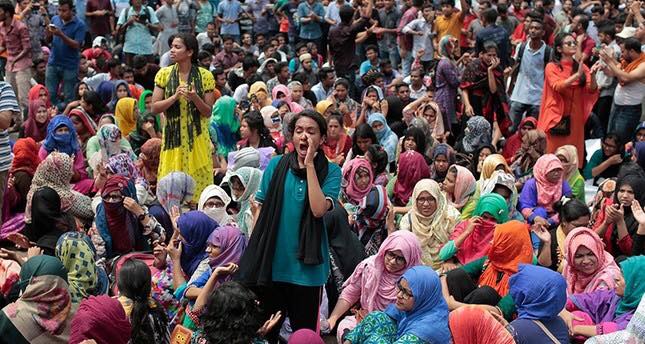
Alam was interviewed by Al-Jazeera, and as one of the leading critics of the government, he eloquently and poignantly expressed what he himself described as a “never ending list” of problems which the Bangladeshi people face when speaking out against the government or other powerful entities. For one, the media is being silenced and mobile internet cut in order to quell the protests which took place, not to mention numerous killings and disappearances – both past and present – of individuals the government see as a threat. This entire circus has been founded amongst an authoritarian system built upon corruption which is bringing the country to her knees.
Following his bold and matter of fact interview, Alam was arrested by the police with a case filed against him under section 57 of the Information and Communication Technology Act for having allegedly given “false information” and making “provocative comments” to different media outlets, which under the Act “prejudice[s] the image of the State”. The Act has been used on numerous occasions against journalists as a tool to confine critics, limit freedom of press, and by default, the freedom of speech. It is an incredibly broad area of law which gags any electronic communication perceived to negatively impact the State. According to the authorities, Alam succeeded in damaging the reputation of the Bangladeshi government, currently ruled by the Awami League under Prime Minister, Sheikh Hasina. According to me, the actions of the authorities were not only deplorable, but also helped to prove the very point which he was trying to make.
The use of the Information and Communication Technology Act in restraining freedom of speech is quite the joke. In its manifesto, the current government made promises of a “Digital Bangladesh” by 2021. Such technological optimism is quite clearly contrary to the actions deployed by the State on ground, as illustrated through the repression of the media and the ongoing limitations on internet access. What is promised by the State, as opposed to what is actually done, seems to be incredibly offbeat.
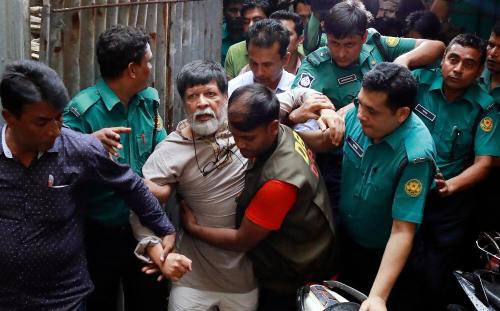
After his arrest, Alam was subsequently moved from jail to a hospital, which leads one to think what atrocities he suffered at the hands of the authorities during his time in custody – all for just speaking his mind. Not only is this a great violation of his human rights, but also a painful marker in the history of Bangladesh for its often inhumane approach towards freedom of speech. As Harry Truman said long ago; “Once a government is committed to the principle of silencing the voice of opposition, it has only one way to go, and that is down the path of increasingly repressive measures, until it becomes a source of terror to all its citizens and creates a country where everyone lives in fear.”
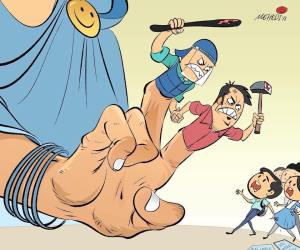
Democratic governments are generally confined within a system of checks-and-balances where no single entity within a branch of government can abuse their power, as other branches are empowered enough to prevent certain actions from taking place. But the role which the common man/woman plays within this system is far greater than any institution of the State. The people – through questioning, challenging, and voicing positive affirmations and negative criticisms – can guide, and at times force the government to act in a way which reflects the many and not the few. Ultimately, it is utilising one’s right to freedom of speech which acts as the greatest instrument in maintaining a system of checks-and-balances, allowing democracy to prevail over authoritarianism and dictatorships.
What is perhaps the biggest paradox is that in 1971, Bangladesh (in what was then known as East Pakistan), fought for independence from Pakistan under Sheikh Mujibur Rahman, the leader of the Awami League. Agitation towards Pakistan was based upon the continuous discriminatory and prejudiced treatment of Bengalis in their own country; despite making up most of Pakistan’s collective population. The shake-downs and constant harassment of Bengalis who dared to speak out against the dominant Pakistani government (ruled by the Muslim League), with the subsequent omission of the Bengali script and language from government exams and coins – amongst other things – built up a sense of nationalistic pride amongst Bengalis who wished to regain control of their land and identity, and ensure equality for their people through guaranteeing freedom of speech. So, despite the Awami League being built upon the principles of equality, justice, democracy and secularism, we now find this very same party making a mockery of freedom of speech, where it silences its own people and treats them as second class citizens in their own country.
 It would be wrong to say that the Awami League alone is the only party guilty of such silencing tactics in Bangladesh; The Bangladesh Nationalist Party (BNP) and the Jatiya Party have too been accused of being behind numerous killings, disappearances and corruptive approaches as an attempt to limit what people say against them. Bangladesh has long suffered at the hands of the elite and those in power, with many common men/women falling victim to this; either by becoming their pawns or lapdogs – in which their actions perpetuate the ongoing corruption and inequality of people, or by speaking out against such tyranny and finding themselves, or the lives of their loved ones, at risk.
It would be wrong to say that the Awami League alone is the only party guilty of such silencing tactics in Bangladesh; The Bangladesh Nationalist Party (BNP) and the Jatiya Party have too been accused of being behind numerous killings, disappearances and corruptive approaches as an attempt to limit what people say against them. Bangladesh has long suffered at the hands of the elite and those in power, with many common men/women falling victim to this; either by becoming their pawns or lapdogs – in which their actions perpetuate the ongoing corruption and inequality of people, or by speaking out against such tyranny and finding themselves, or the lives of their loved ones, at risk.
The international community is aware of what is happening, yet nothing is really being done. There should be pressure imposed upon the Bangladeshi government regarding the mistreatment of its own citizens, urging a thorough investigation to take place on the arrest and custodial torture of Shahidul Alam and those like him. The case against Alam, and others in his position must be dropped. Focus should also be placed upon proper reform of the law in order to ensure once again, the true existence of freedom of speech in our country. There must be checks put in place to end the abuse of arbitrary power by the State.
Clearly, the action taken against a renowned and high-profile figure such as Alam was intended to scare us. But to defend the likes of Alam, is to defend the freedom of speech – a right which should be guaranteed to all humans. My point is, we did not fight for freedom from the Pakistanis to face this kind of horrific treatment from our own. We fought for independence to secure a better future for our people. We fought for a democratic and secular State. Real change must be brought about, and in order to do that, affirmative action must be taken by the people. The people of Bangladesh, including those of us who aren’t in Bangladesh, must continue to speak out, press for, and defend what is right and what is just. The only way to do that is to continue exercising our freedom of speech, for that is what will bring about peace and real progress. We must fix the fractured political reality which exists at the top and give the power back to the people. This is the time for change, because enough, really is enough.
“A people which is able to say everything becomes able to do everything.”
―
Shahidul Alam’s full interview with Al-Jazeera can be found here: https://www.youtube.com/watch?v=J9j3EgLm62Q
NOTE: As of October 2018, Shahidul Alam still remains imprisoned.
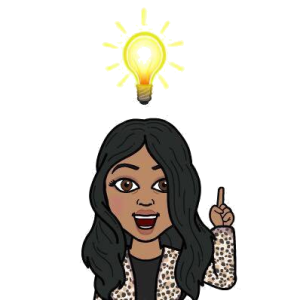
Very Nice Article.Great Work Sam.
Regards
Buddhikala
LikeLike
Thank you, I appreciate your kind words!
LikeLike